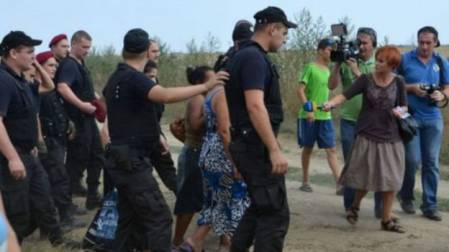Crucial victory as Ukrainian court orders compensation for Roma families driven out of Loshchynivka

A court of appeal in Odesa has found that the police failure to react adequately during anti-Roma riots in August 2016 was unlawful, and has awarded compensation to the families driven from their homes. Although the amount awarded was far less than that demanded, this is, nonetheless, vital first for a Ukrainian court. It is an especially important precedent given the virtual epidemic of attacks on Roma since that time.
The ruling by the Fifth Odesa Administrative Court of Appeal on 25 April is a huge victory for Yulia Lisova and Volodymyr Kondur who had refused to give up during almost three years of obstruction, especially from the prosecutor’s office.
The ruling, which is now in force, found both the inaction by the police during the riots and the actions of the Loshchynivka Village Mayor, Viktor Paskalov who was responsible for the decision to evict the Roma families to have been unlawful. The court ordered that compensation of 10 thousand UAH should be paid to each of the plaintiffs, with the money to be paid by the Loshchynivka Village Council and the Odesa Regional National Police. The lower court had, in fact, found Paskalov’s actions unlawful, but had dismissed all the other parts of the claim, including compensation.
Lisova reports that during the 25 April hearing, the Mayor’s representative presented two mutually exclusive ‘arguments’. It was asserted, on the one hand, that the claimants had not lived in Loshchynivka and, on the other, that they had violated the traditions of the village and had deserved to be evicted.
The police representative claimed that sending 11 police officers to cope with 180 rioting individuals was “proportionate and effective”. In fact, of course, such a small number meant that the officers were largely powerless. They do, however, have certain authority and the video footage here suggests that they made no effort at all to intervene. There were also no attempts to call in reinforcements from other areas.
The riots in Loshchynivka were triggered by the discovery of a 9-year-old girl’s body in an abandoned building. There are extremely strong grounds for concern about the immediate arrest and the on-going trial of Mykhailo Chebotar, who was then 21. His arrest appears to have only served as a pretext for the riots. Chebotar is from Loshchynivka and had lived there all his life, giving the lie to the claims of those participating in the effective pogrom that they were against Roma who had arrived in the last three years.
A crowd of 150-170 locals set fire to one Roma building and devastated several others, with the fact that nobody was injured, probably only because they had managed to flee in time. Around ten homes were smashed up. At the time, the Odesa publication Dumskaya noted that the three homes of more affluent Roma had not been targeted.
The fact that Paskalov used the riot to ‘persuade’ or force the Roma community to leave Loshchynivka was a shocking demonstration of collaboration with anti-Roma rioters. At a village meeting on 28 August 2016, he told the crowd that Roma had committed unlawful acts and that therefore he, like other villagers, wanted only one thing – that the Roma stopped living in Loshchynivka. He also read out a supposed ‘decision’ from this meeting that the Roma should ‘leave’.
Not one of the rioters responsible for the destruction on 27 August 2016 has been prosecuted, and the criminal investigation into police inaction has been terminated by the prosecutor’s office several times, only to be reinstated after Lisova and Kondur turned to the courts.
Lisova notes that she was pleasantly taken by how thoroughly the court on 25 April studied all the circumstances of the case.
The amounts awarded can in no way compensate for the loss of the people’s homes, and, as Kondur points out, the families involved are now unable to return. The importance of the principle established by the court, especially with respect to the failure of the police to react properly cannot be overstated.
There were at least five major attacks on Roma temporary settlements during 2018, with the police reaction to most of them causing immense concern. It was, for example, only after video footage of the violent dispersal of a Roma camp on Lysa Hora by neo-Nazi C14 thugs emerged on 25 April 2018 that the Kyiv police finally stopped denying the inadequacy of their response to a situation in which people were fleeing in terror from masked assailants (details here).
It was only with the fatal attack on a settlement on the outskirts of Lviv on 23 June that the police and authorities reacted swiftly and well. The trial over the attack and killing is currently underway in Lviv (details here).
It was widely felt that the lack of firm measures, and acknowledgement of failings after the riots in Loshchynivka in August 2016, and then a fatal incident in Vilshany (Kharkiv oblast) in May 2017, had prompted the perpetrators of foul anti-Roma attacks to believe that they could act with impunity.
Thanks to the persistence of two committed lawyers, an Odesa court has demonstrated that there is no impunity for the perpetrators, nor enforcement officers who stand back and do nothing.
Please, however, note the ongoing and very disturbing trial of Mykhailo Chebotar. There are strong grounds for fearing a grave miscarriage of justice. Details here:





